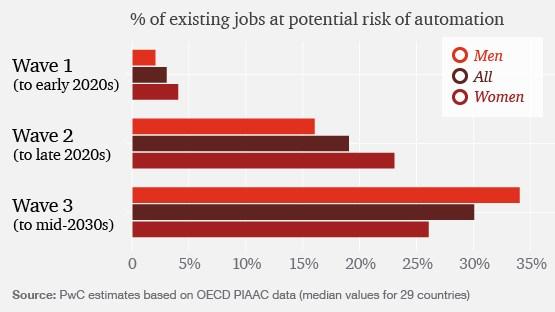Automation and artificial intelligence (AI) are rapidly transforming the global job market, driving profound changes across industries and reshaping workforce dynamics worldwide. From manufacturing floors to corporate offices, intelligent systems are automating routine tasks, enhancing productivity, and unlocking new opportunities for innovation. Yet, this technological revolution also raises critical questions about job displacement, skill requirements, and economic inequality. As companies increasingly integrate AI-powered tools-ranging from autonomous web agents to advanced asset management and IT operations solutions-understanding how these technologies redefine employment patterns is essential for policymakers, businesses, and workers alike [[1]](https://research.ibm.com/publications/web-agent-revolution-enhancing-trust-and-enterprise-grade-adoption-through-innovation) [[2]](https://research.ibm.com/topics/ai-for-asset-management) [[3]](https://research.ibm.com/topics/ai-for-it).
Table of Contents
- Automation Drives Shift in Skill Demand Across Industries
- AI Integration Spurs Job Creation in Emerging Tech Sectors
- Navigating Workforce Transition Challenges with Strategic Reskilling
- Policy Recommendations for Equitable Employment in the AI Era
- Future Outlook
Automation Drives Shift in Skill Demand Across Industries
Across multiple sectors, the integration of automation and AI technologies is rapidly redefining workforce requirements. Roles centered around repetitive tasks and manual operations are seeing a marked decline, replaced by a growing demand for skills that emphasize digital literacy, complex problem-solving, and adaptability. Industries such as heavy manufacturing and infrastructure development are pioneering this transition,with robotics and AI systems not only enhancing efficiency but also reshaping the types of expertise valued on the factory floor and in supply chain roles.
Key skill trends emerging include:
- Proficiency in managing and interfacing with automated systems
- Advanced data analytics and interpretation capabilities
- Interdisciplinary knowledge combining technical and soft skills
- Continuous learning mindset to keep pace with evolving technologies
As the labor market evolves, employers are increasingly prioritizing versatility alongside technical competence, underscoring a shift from narrowly specialized roles to multifaceted professionals capable of navigating complex AI-augmented workflows.
AI Integration Spurs Job Creation in Emerging Tech Sectors
As AI technologies increasingly permeate various industries, they are simultaneously fostering the emergence of new job categories and revitalizing traditional roles. Sectors such as AI development,data science,and automation engineering have witnessed a important uptick in demand for specialized skills. Companies are investing heavily in building AI-driven solutions,which has spurred the creation of jobs ranging from machine learning engineers to AI ethics consultants. This growth is also reflected in areas supporting AI infrastructure, including cloud computing and cybersecurity, where employment opportunities continue to expand.
Key areas fueling job growth include:
- AI application development and customization
- Data analysis and predictive modeling
- Robotic process automation implementation
- AI system maintenance and optimization
- AI governance and policy management
These roles not only require technical acumen but also demand interdisciplinary expertise, underscoring a shift towards more collaborative and innovative work environments. As AI integration deepens, the labor market is adapting by coalescing around new skill sets and knowledge domains, positioning emerging tech sectors as vital engines for future employment growth.
Navigating Workforce Transition Challenges with Strategic Reskilling
As automation and AI accelerate across industries, workforce transitions present complex challenges demanding strategic reskilling initiatives. Companies must move beyond traditional training models to embrace dynamic, continuous learning programs tailored to evolving role demands. This approach not only addresses skill gaps but also fuels employee engagement and retention by fostering a culture of adaptability. Key strategies include:
- Targeted upskilling aligned with AI-augmented workflows
- Partnerships with educational platforms to provide modular, just-in-time learning
- Data-driven assessment to identify critical skills for future job zones
Organizations that prioritize reskilling as a strategic imperative can better navigate wage disparities and varied workforce experience, leveraging insights drawn from comprehensive wage data and occupation analyses. By unlocking human potential through responsible AI integration and talent transformation, businesses position themselves to thrive amid the shifting employment landscape, ensuring equitable growth opportunities across diverse labor segments.
Policy Recommendations for Equitable Employment in the AI Era
To foster a fair transition amid rapid AI integration, policymakers must prioritize inclusive workforce development programs that bridge skill gaps across diverse demographics. Emphasizing lifelong learning and reskilling initiatives tailored to vulnerable sectors ensures that no group is disproportionately displaced by automation. Additionally, establishing transparent, data-driven metrics to monitor employment equity will hold industries accountable and promote just labor practices in emerging tech-driven roles.
Creating adaptive social safety nets is equally crucial to support workers navigating career disruptions. Governments should consider policies such as:
- Worldwide basic income pilots or wage insurance schemes to mitigate income volatility;
- Incentives for companies that actively hire and train historically marginalized populations;
- Strengthening anti-discrimination enforcement in AI-driven hiring and management systems to prevent algorithmic bias.
These measures can collectively secure equitable opportunities and uphold fairness as automation reshapes labor markets worldwide.
Future Outlook
As automation and AI continue to advance, their transformative impact on the global job market is undeniable.While certain roles may decline, new opportunities are emerging that demand fresh skills and adaptability. The future of work will hinge on how businesses and workers harness these technologies to drive productivity and innovation.Staying informed and agile will be essential as the landscape evolves,ensuring that the workforce is prepared for the demands of tomorrow’s economy. For a comprehensive understanding of these shifts, ongoing analysis and strategic planning remain critical in navigating the path forward.

